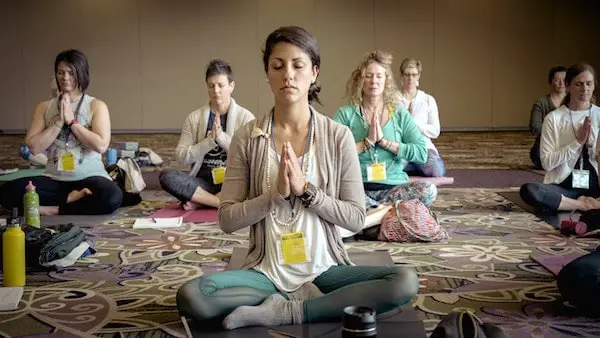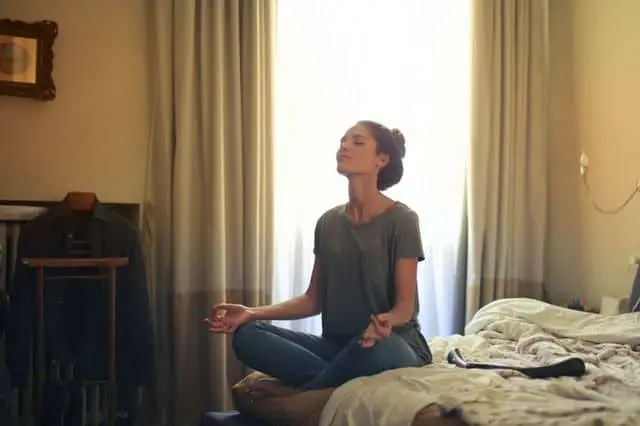When I was reading some details about meditation earlier this week, I learned how relaxing and rejuvenating it can be for the mind and body. After that, I started to wonder if it could replace sleep. So, I did some research to find out.
Can sleep be replaced with meditation? Humans need sleep in order to survive and function properly, so the short answer to this question is no.
Even though sleep cannot be replaced with meditation, you can meditate to become more relaxed and even induce sleep if you are having trouble doing so.

Sleep is such a vital part of our daily operation and without it, we can’t flourish or be productive. It is on the same level of importance as eating and exercising, so why might someone want to “replace” sleep with something else?
Is it even possible for it to be supplemented by something else? Sure, people drink coffee or caffeinated tea to keep them awake, but can sleep be replaced by another energy creating force? Keep reading to get the answer to these questions and much more.
Can Sleep Be Replaced with Meditation?

You cannot replace sleep completely, but it may be possible to need less of it by meditating more and that will require some training.
It has been suggested that not only can meditation replace sleep to some degree, it can also improve your sleep patterns! Take a look at the list down below to get some more details on this topic.
Here are some factors that tie meditation and sleep together:
- Melatonin is needed in the body to sleep
- Meditation provides these Melatonin levels
- Training the mind through meditation can lead to needing less sleep
- Meditation can help induce sleep
First of all, the body requires melatonin to activate the need to sleep, and the act of meditation provides just enough for you to reach REM sleep quicker and have a longer, more productive sleep.
Training your mind through meditation to need less sleep could be the trick to gaining the ability to sleep less and have a more efficient sleep – it is healthier than taking a supplement too!
There certainly are many drugs that aid in substituting sleep with more energy such as caffeine pills or energy shots like 5-Hour Energy, but there’s an interesting idea that exists and that meditation can both supplement and compliment sleep in the most natural way possible.
Meditation involves training yourself, becoming more aware of yourself, and gaining healthy perspectives. It is considered a skill and the aim is to master it in order to reach the highest level of mindfulness you can.
Though the exact origins of meditation have yet to be discovered, it is believed to have existed many thousands of years ago in the Eastern world.
The word “meditation” derives from the Latin word “meditatum” which means, “to ponder”. It’s theorized that hunter-gatherers practiced various forms or variations of meditation and they simply passed down their knowledge from generation to generation.
There are many different ways to meditate and no one way is exclusive to your needs, though you may find that one or two are more beneficial, easier, or even more conveniet in your life than others.
Headspace (source) explains that there are many different types of meditations and their usefulness vary from person to person but are all still effective nonetheless. There are six general meditation techniques that encompass many more types.
Here are some of the main types of meditation that you can practice:
- Spiritual Meditation
- Mindfulness
- Movement Meditation
- Focus Meditation
- Visualization
- Chanting
Spiritual meditation is prevalent in the Eastern world, primarily among Buddhists and Hindus and focuses on training to become the best version of yourself and becoming one with higher powers.
Alternatively, the mindfulness technique is very popular and commonly practiced in the Western world. It focuses on gaining understanding of how our individual minds work and training yourself to overcome inadequacies such as intolerance and dissatisfaction with your life.
If you are active and like to keep your body moving, the movement meditation method would benefit you best. Tai Chi and martial arts are just a couple examples of the level of physical activity those who practice movement do on a regular basis.
While using the focus meditation method, on the other hand, you are doing exactly what it sounds like: focusing. You relieve yourself of all other distractions and you point your attention to item, one movement, or one thought.
This method allows you to become one with your mind and to hold yourself accountable when it wanders by simply acknowledging the distraction and regaining your attention back to that one thing.
Traditionally practiced by Tibetans, visualization enables you to emotionally connect with an image or scene in your mind.
While practicing, you embrace the feelings and thoughts the scene brings you, creating a sort of escape from the real world. This can be done alone, but takes a lot of practice and most importantly, guidance.
Chanting also focuses on a focal point, but this time on the sounds and rhythms you make. It is said to nurture a deeper self-awareness, compassion, and confidence. It is also recommended that this method be guided by a teacher when starting out.
Meditations can range from the types of thoughts you focus on like an image or a person to even the physical actions you take such as breathing or reciting a word or short phrase to keep your mind steady and concentrated.
Some meditations can be done alone while some will require a guide or a “teacher” to lead you through the motions. It can be done anywhere, but it is recommended that you reserve a quiet place at a quiet time for optimal focus.
What Are the Benefits of Meditation Besides Sleep?

Many people may assume that mediation is all about the mental, but meditation improves all aspects of life, including physical, mental, emotional, and spiritual.
This article is owned by Sleeping Report and was first published on June 3, 2019
Here are a few ways meditation can improve your life, from a list compiled by Eco Institute:
- Physical
- Mental
- Emotional
- Spiritual
First and foremost, meditation comes with a lot of physical benefits. These include weight loss, pain relief, serotonin boosts, faster healing, strengthened immunity system, and even better blood circulation throughout the body.
In addition, meditation can also improve the mind-body connection, encouraging positive mindsets and balanced thoughts. You can also adopt a better perception when you practice mindful meditation.
You can also experience emotional benefits from meditating on a regular basis. It can help you to control your anger, calm anxiety, relieve stress, aid PTSD symptoms, and provide mental clarity overall.
Finally, you can find positives in the spiritual department from meditation. More specifically, you might find that your spiritual awakenings are empowered, you have a peace of mind and higher consciousness, and even an improved sense of intuition.
This article is owned by Sleeping Report and was first published on June 3, 2019
Why Is Sleep Important and How Much Do We Need?
Why do we inhale the air or drink the water? The answer to those questions seem simple, as they are things we do daily without any thought, but all are essential to us functioning at high, exceptional levels.
When you can’t do or don’t have access to something so essential as clean air, water, or even sleep, your functionality plummets. Much like everything else we need, sleep is very important and has several major benefits in our lives.
Benefits Of Sleep:
- Helps body to repair itself
- Encourages healthy brain and body
- Processing events and emotions through dreams
- Feeling better mentally and physically
First of all, sleep is the perfect time for the body to repair itself. While you sleep, the body begins to release hormones that work to regrow damaged tissue as well as heal aches and pain.
It is also known that your body makes more white blood cells while you sleep, which are essential in fighting off sicknesses, viruses, and bacteria.
Proper sleep encourages a healthy brain and body as well. Getting the right amount of sleep ensures that our bodies can keep up with our brains when we’re awake.
When you are forced awake having not gotten enough sleep, you tend to be groggy and your motor is slower and getting things done becomes just as hard as being motivated to do those things.
Without proper sleep, it’s difficult to maintain an adequate level of productivity throughout the day.
While dreaming, we can process events and emotions. Dreams themselves are quite mysterious, as we still don’t know why we have them or what many of them mean, but that doesn’t mean they don’t have a purpose!
Through dream interpretation or merely using association, you can dissect your dreams and begin to understand how helpful they can be in your daily struggles as you attempt to progress through harder or even calmer times.
You feel better after you sleep, both mentally and physically. That refreshed feeling you get after catching up on sleep with a nice mid-afternoon nap or actually sleeping a solid 8 hours before having to get up for work the next day is just the boost you need to get you through what the day has in store for you.
You also tend to have a better attitude and are more fueled and alert after a good sleep, as opposed to when you don’t get any.
Research shows that the typical adult needs 7 to 9 hours of sleep to function properly, however, many people do not get that kind of sleep.
In fact, for some, even getting 7 hours of sleep is a luxury that comes and goes too scarcely. Though adults only need 8 hours on average, other stages of life require more or less.
The range and the amount of time required in each age group changes drastically as you get older, but with the importance of technology in our lives continuing to rise as well as eating habits, work and home life balance and so forth, it becomes hard for people to sleep as long as they should and to get a good rest.
Most experts would agree that maintaining a healthy sleep schedule; like sleeping and waking up approximately the same time every day. Including a nice bedtime ritual to relax the mind. Having a daily exercise routine to keep blood flowing nicely. Sleeping in a comfortable environment including a disruption free room, good mattress and pillow, and of course, avoiding any thing that could be stimulating like caffeine or electronics right before bed.
SleepingReport.com copyright article was updated on ..
Conclusion
We will conclude by acknowledging that nothing can replace sleep.It’s far too important of a human function to do away with, but the real moral here is that meditation can improve your sleep patterns tremendously and with time and practice can enable you to need less sleep to function just as well.

